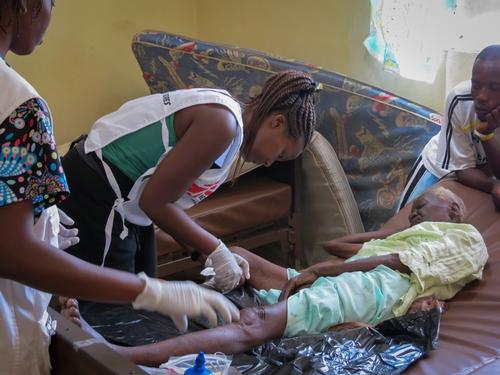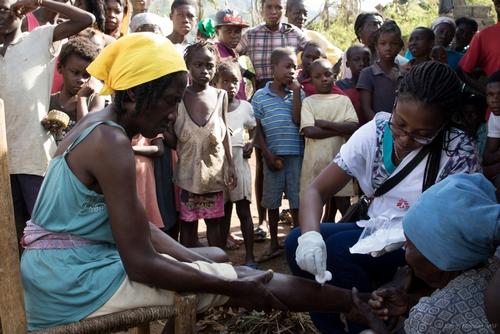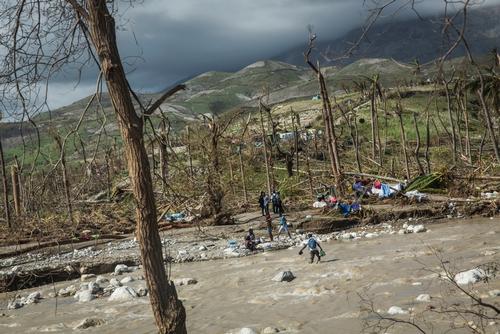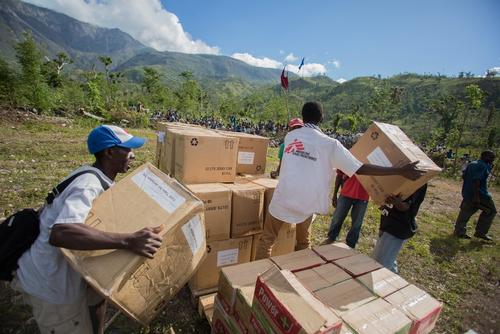Port au Prince - Three weeks after hurricane Matthew swept over southwestern Haiti, Médecins Sans Frontières (MSF) is concerned that lack of shelter, safe drinking water, food and access to healthcare will lead to further deterioration of people’s health. “Women, men and children are in a very vulnerable position”, explains Chiara Burzio, MSF Emergency Medical Coordinator. “We are particularly concerned by the heightened risk of infectious diseases, cholera, and the deteriorating nutritional status of children under five in the isolated areas affected by the hurricane.”
Food scarcity
MSF teams have observed signs food scarcity – most of the crops are destroyed or flooded and the vast majority of livestock is missing or dead. “During our medical consultations, our patients tell us they don’t know how to feed their families,” says Emmanuel Massart, MSF project coordinator in Grand Anse. “Families lost livestock, fruit trees and their entire personal reserves during the storm, and what is left is decaying because of insufficient protection from the rain.” In Sud and Grand Anse, MSF has started to monitor the nutritional status of children under five through mobile clinics; those in need are being treated with ready-to-use therapeutic food.
Lack of shelter and safe drinking water
The category four hurricane blew away the roofs of most houses in the southwest of the country; heavy rains have further damaged the few houses still standing. “Entire families have lost their homes. Their houses were totally destroyed. They are now living in temporary shacks or are sharing overcrowded spaces with other families” says Renate Sinke, MSF project coordinator in Nippes.
Wells, water networks and reservoirs have been also been damaged. “The hurricane damaged already weak water supply systems. These systems were further damaged with the floods that followed the hurricane. The people do not have access to clean water”, says Yves Lyre-Marcellus, MSF water and sanitation specialist in Nippes.
MSF assessed six wells on the coastline from Port à Piment to Les Coteaux, of which three were contaminated by salt water. In the valleys and mountains, water sources are sometimes mixed with unsafe river water or debris from landslides.
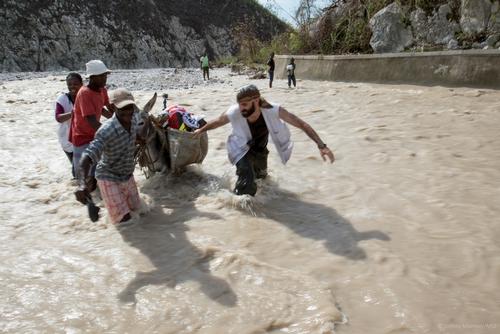
Remote villages totally cut off
Remote villages were already hard to reach before the hurricane but are now nearly inaccessible. “The two roads leading to the Baradères district are currently cut off,” Sinke explains. “People cannot enter or leave the district. Supplies cannot get into the villages. Trade cannot happen anymore.”
The inability to access remote villages is also impacting the provision of healthcare. “Upon arrival in Pourcine, a village in the mountains, we treated fourteen people with serious injuries and one woman who had a miscarriage,” says Massart. “If open wounds are not treated properly, the patient goes into sepsis. If there is no access to care, the patient will likely die.”
Treating cholera
As the number of suspected cholera patients in MSF’s cholera treatment centre in Port à Piment decreased to six on 25 October, the neighbouring town of Chardonnières reported forty suspected cases the same day. As the epidemic is unpredictable given current conditions, it is crucial to monitor new cases, provide sufficient treatment centres and ensure access to safe drinking water.
Three weeks into its emergency response in hurricane-affected areas, MSF teams have:
- Consulted more than 2,500 patients in 27 villages. In Nippes, the most common diseases treated are diarrhoea, gastrointestinal infections, urinary infections and upper respiratory infections. In Sud and Grand Anse, medical teams continue to treat many wounds.
- Referred ten patients by helicopter to Port au Prince: nine patients to the MSF trauma centre Tabarre and one patient to the MSF centre for severe burns.
- Distributed temporary shelter to 1,400 families in Sud.
- Set up two cholera treatment centres (CTC) in Port à Piment and Baradères and treated 229 patients with suspected cholera.
- Provided training, water and sanitation support to six CTC in Grand Anse and one CTC in Nippes.
- Distributed medical supplies and non-food items to two health centres and two CTC in Artibonite.
- Set up four water bladders in Grande Anse and one in Port à Piment, each providing 15 cubic metres of drinking water per day.
- Distributed 900,000 water treatment tablets in Sud.
- Reinforced its cholera surveillance activities in the ten provinces of the country.



